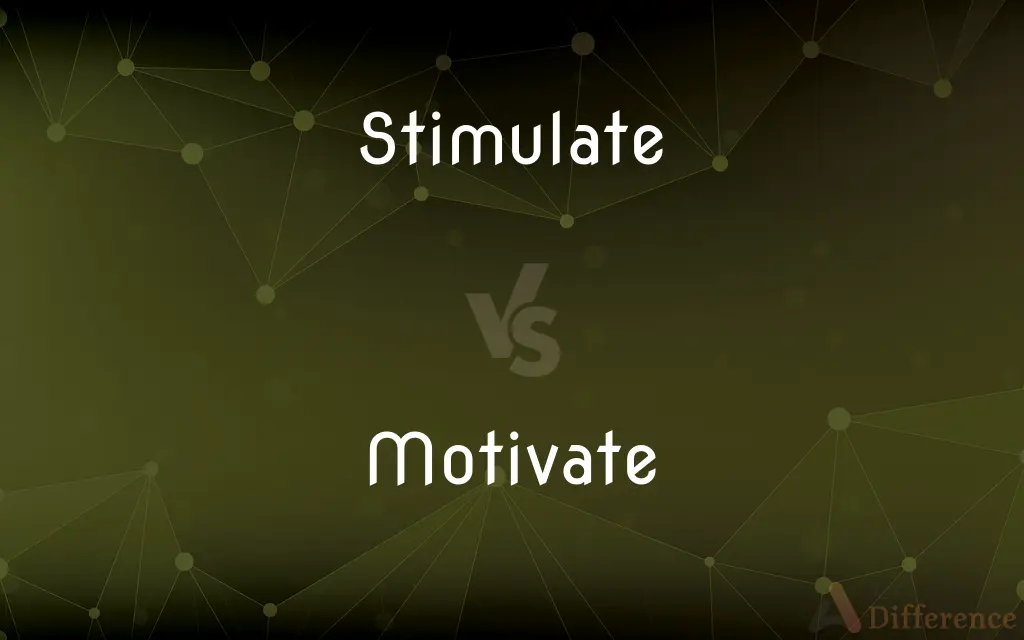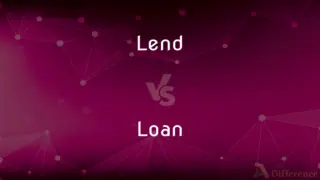Stimulate vs. Motivate — What's the Difference?
By Tayyaba Rehman & Maham Liaqat — Updated on April 4, 2024
Stimulate involves invoking a response or enhancing activity, while motivate focuses on providing reasons or incentives for action.

Difference Between Stimulate and Motivate
Table of Contents
ADVERTISEMENT
Key Differences
Stimulate refers to the action of encouraging a part of the body or mind to function or become more active, often through external factors. On the other hand, motivate is about influencing someone's behavior or decisions by presenting reasons, aspirations, or incentives, aiming to spur them into action.
While stimulate can apply to both physiological and psychological aspects, such as stimulating the brain with puzzles or the economy with fiscal policies, motivate is predominantly psychological, involving desires, goals, and emotional drives. Whereas stimulation can be immediate and sometimes involuntary, motivation is more about the long-term encouragement and the building of an internal desire to achieve something.
In the context of learning, to stimulate means to make the learning environment more engaging or the brain more receptive to information. However, to motivate learners involves creating a personal connection to the material, highlighting its value and how it aligns with their goals. Stimulation is about the method of delivery, while motivation is about the reason behind the learning.
In business, stimulating growth could involve introducing new technologies or processes to improve efficiency, whereas motivating employees entails aligning their personal goals with the objectives of the company, often through rewards or recognition. Stimulation focuses on the environment or tools at one's disposal, whereas motivation focuses on personal engagement and aspiration.
The effects of stimulation are often immediate, providing a direct boost to activity or engagement, but might not sustain action without additional input. Motivation, however, once instilled, has the potential to drive prolonged and self-sustained activity, as it taps into personal drives and goals.
ADVERTISEMENT
Comparison Chart
Focus
Enhancing activity or responsiveness
Providing reasons or incentives for action
Application
Physiological and psychological
Predominantly psychological
Duration
Immediate, sometimes short-lived
Long-term encouragement
Goal
Increase activity or engagement
Spur into action based on desires or goals
Methods
External factors (e.g., environment, tools)
Internal factors (e.g., desires, recognition)
Context Examples
Stimulating the economy, brain activity
Motivating employees, learners
Outcome
Immediate boost to activity
Sustained engagement and action
Dependency
On external input for continued effect
Builds internal drive for self-sustained action
Compare with Definitions
Stimulate
To excite or invigorate (a physical or mental response).
Bright colors can stimulate a baby's vision.
Motivate
To provide a reason or incentive for someone to act.
The promise of a bonus motivated the team to exceed their targets.
Stimulate
To prompt or incite to action or heightened activity.
The new policy is designed to stimulate innovation in the industry.
Motivate
To create a drive or desire within someone to do something.
Personal growth motivates her to seek new challenges.
Stimulate
To encourage or boost activity in an area or field.
Lowering interest rates is intended to stimulate the economy.
Motivate
To inspire someone to achieve or pursue goals.
His coach's encouragement motivated him to train harder.
Stimulate
To provoke or trigger a reaction or response.
The teacher used games to stimulate interest in the subject.
Motivate
To influence the behavior or direction of someone through incentives or reasons.
Employee of the month awards motivate staff to perform well.
Stimulate
To enhance the function or activity of.
Certain nutrients stimulate the immune system.
Motivate
To engage someone's interest or enthusiasm in an activity.
Finding a hobby that aligns with your interests can motivate you to dedicate time to it.
Stimulate
Raise levels of physiological or nervous activity in (the body or any biological system)
The women are given fertility drugs to stimulate their ovaries
Motivate
To provide with an incentive or a reason for doing something; impel
What motivated you to get a new job? Their criticism is motivated by jealousy.
Stimulate
To rouse to action or increased activity; excite
A policy that stimulated people to protest.
Incentives to stimulate consumer spending.
Motivate
To cause to be enthusiastic
The coach motivated his players with an inspiring pep talk.
Stimulate
To increase temporarily the activity of (a body organ or system, for example).
Motivate
(transitive) To provide someone with an incentive to do something; to encourage.
The weekly staff meeting was meant to motivate employees.
Stimulate
To cause to be interested or engaged
Animals in zoos need to be stimulated to remain healthy.
Motivate
(transitive) To animate; to propel; to cause to take action
He was motivated purely by self-interest.
Steam-motivated pumps are used in manufacturing.
Stimulate
To excite or invigorate (a person, for example) with a stimulant.
Motivate
To provide with a motive; to move; impel; induce; incite.
Stimulate
To act or serve as a stimulant or stimulus.
Motivate
Give an incentive for action;
This moved me to sacrifice my career
Stimulate
To encourage into action.
Stimulate the economy
Stimulate
To excite as if with a goad; to excite, rouse, or animate, to action or more vigorous exertion by some pungent motive or by persuasion; as, to stimulate one by the hope of reward, or by the prospect of glory.
To excite and stimulate us thereunto.
Stimulate
To excite; to irritate; especially, to excite the activity of (a nerve or an irritable muscle), as by electricity.
Stimulate
Act as a stimulant;
The book stimulated her imagination
This play stimulates
Stimulate
Cause to do; cause to act in a specified manner;
The ads induced me to buy a VCR
My children finally got me to buy a computer
My wife made me buy a new sofa
Stimulate
Stir the feelings, emotions, or peace of;
These stories shook the community
The civil war shook the country
Stimulate
Cause to be alert and energetic;
Coffee and tea stimulate me
This herbal infusion doesn't stimulate
Stimulate
Cause to occur rapidly;
The infection precipitated a high fever and allergic reactions
Stimulate
Stir feelings in;
Stimulate my appetite
Excite the audience
Stir emotions
Stimulate
Provide the needed stimulus for
Common Curiosities
What is the main difference between stimulate and motivate?
Stimulate is about invoking an immediate response or enhancing activity, usually through external means, while motivate focuses on providing reasons or incentives for sustained action.
Can a person be stimulated but not motivated?
Yes, one can be stimulated to show an immediate response without having the internal drive or motivation to continue the action long-term.
How do companies use stimulation and motivation differently?
Companies use stimulation by improving work environments or introducing new technologies, and motivate by aligning employee goals with rewards.
Can both stimulation and motivation be used in education?
Yes, education benefits from both by using stimulating methods to engage students and motivating them by connecting learning to their goals.
How do stimulation and motivation work together in therapy?
In therapy, stimulation might be used to activate mental processes, while motivation techniques encourage patients to pursue their therapeutic goals.
How does one switch from being stimulated to being motivated?
Transitioning involves finding personal reasons and intrinsic incentives for the activity, moving beyond immediate engagement to long-term commitment.
Can external rewards both stimulate and motivate?
External rewards can initially stimulate activity and, if aligned with personal goals, can also serve as motivation for continued effort.
Is motivation always positive?
While motivation is generally seen as positive, driving individuals towards goals, it can be driven by both positive incentives and negative consequences.
Do stimulation and motivation have different effects on performance?
Stimulation can provide an immediate boost, while motivation leads to sustained engagement and improved performance over time.
Can stimulation lead to motivation?
Yes, effective stimulation can spark interest, which, when nurtured with the right incentives and reasons, can develop into motivation.
How do goals relate to stimulation and motivation?
Goals are primarily related to motivation, serving as the desired outcome that motivates action, whereas stimulation is more about the means to activate or enhance the process towards those goals.
How do personal values influence stimulation and motivation?
Personal values can shape what stimuli one responds to and what incentives will effectively motivate an individual towards action.
Is motivation more important than stimulation?
Both are important, but motivation is crucial for sustained effort and achieving long-term goals, while stimulation can facilitate immediate engagement.
What role does environment play in stimulation and motivation?
Environment can stimulate by enhancing engagement and productivity, while a supportive environment can motivate by reinforcing personal goals.
Can a lack of stimulation lead to decreased motivation?
Yes, without sufficient stimulation to engage interest or activity, motivation can wane due to lack of engagement or boredom.
Share Your Discovery

Previous Comparison
Lend vs. Loan
Next Comparison
Brief vs. RecapAuthor Spotlight
Written by
Tayyaba RehmanTayyaba Rehman is a distinguished writer, currently serving as a primary contributor to askdifference.com. As a researcher in semantics and etymology, Tayyaba's passion for the complexity of languages and their distinctions has found a perfect home on the platform. Tayyaba delves into the intricacies of language, distinguishing between commonly confused words and phrases, thereby providing clarity for readers worldwide.
Co-written by
Maham Liaqat













































